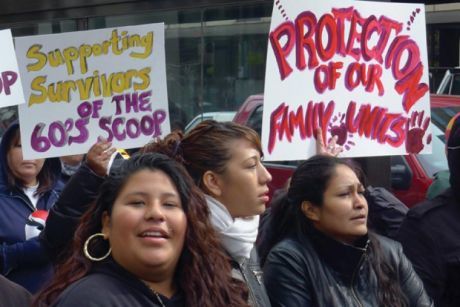Reports
You are here
Resisting the "Sixties Scoop” theft of Indigenous children

September 14, 2016
“Treaties did not give the government the right to take our children,” announced Ontario Regional Chief Isadore Day to over 300 people who attended the August 23, 2016 rally in Toronto to support survivors and families of the “ ‘60s Scoop.”
The term refers to a concerted action by federally-funded provincial governments across Canada to supposedly keep Indigenous children safe through arranging permanent foster care or adoption into non-Indigenous homes—often hundreds if not thousands of miles from the children’s communities.
Colonial theft
Their removals were “justified” by the enforcement of child welfare agencies policies which saw First Nations’ ways of parenting as not up to the “standard” of white, Eurocentric society. This was combined with a refusal to alleviate the harsh conditions caused by colonially enforced poverty that made families vulnerable.
In Ontario alone, over 16,000 children were removed. The effects were devastating for the parents whose children were taken away. And those who were removed, like virtually all adoptees, ultimately wanted to come home. If they were allowed to find out where home was and if they were able to get there, they often felt they did not fit in because they had no knowledge of the community’s language or traditions.
Fighting back
But the spirit of resistance was never far away and today in every province Indigenous peoples are fighting back through lawsuits against either the federal or provincial governments responsible.
In Ontario the fight is led by Beaver House Chief Marcie Brown Martel. As Justice Ian Nordheimer, part of the panel that rejected the government’s efforts to have the class action thrown out, wrote, “The respondents allege that . . . Canada wrongfully delegated its executive responsibility as guardian, trustee, protector and fiduciary of aboriginal persons by entering into an agreement with Ontario that authorized a child welfare program that systemically eradicated the aboriginal culture, society, language, customs, traditions and spirituality of these children.”
The survivors are asking for $85,000 each in damages and allege that many children suffered emotional, psychological and spiritual harm as a result of a loss of connection to their indigenous culture.
One Indigenous activist in attendance was Sandi Mansfield, now living in the Niagara region. She told socialist.ca, “Even though colonialism ended residential schools, governments scooped kids who they set out to adopt or foster. This wasn’t unique to Canada. The federal government (under Harper and now Trudeau) has fought for seven years to have this court case thrown out but in June of this year, the case was allowed to proceed. The issue has brought together a lot of First Nations.”
Placards at the rally had slogans like “Canada can’t hide genocide”, “Sixties Scoop, shame on you”, “Stealing a child government genocidal policy.” Many First Nations were represented at the rally from locations around Ontario including Sault Ste. Marie, St. Catharine’s, Ottawa, Attawapiskat, Beaver House, Wikwemikong and many others.
Speakers included survivors like Beaver House Chief Marcia Brown Martel, one of the individuals leading the class action lawsuit. She was only four years old when she was removed. After several placements in foster care she was adopted and moved to Texas. Her tragedy was compounded by the fact that her community was physically relocated so that by the time she came “home” there was no land base for the community.
Stacy Laforme, from Mississaugas of New Credit First Nation, said “Reconciliation is about truth and justice… you have to redress the wrongs, deceits and lies. Show the same future for our children as yours… The irony is that Canada now needs First Nations to take the lead role to save our planet.”
As Deputy Grand Chief Glen Hare noted, “During the election the Liberals said there was going to be change. And First Nations made a difference because of our big increase in votes. But nothing has happened with child welfare… See what it would be like for you if I took your kids away for even two days. Don’t ever quit because the older adoptees are still trying to make their way home.”
Another survivor, Chief Janice Henderson, has been striving to regain her dignity, which has been a challenge because of having to learn her language. She said “Don’t give up. Try to learn your language and way of life.”
NDP MP Charlie Angus said the movement of history is against the Liberals’ efforts to stall this court case. He noted that Beaver House, with no land for its Indigenous people, is the site of one of the largest gold reserves in the world. He called on the government to stop fighting the court case and to try reconciliation instead.
Next steps
The August 23 hearing was a one-day event to mark the beginning of the court process. Hearings will resume in December of this year for the Ontario lawsuit, but you can learn more about court actions happening across the country by checking with your province’s First Nations leadership organizations. It is important to support survivors and their families against the ongoing efforts by governments to trample the rights of Indigenous peoples.
Section:










